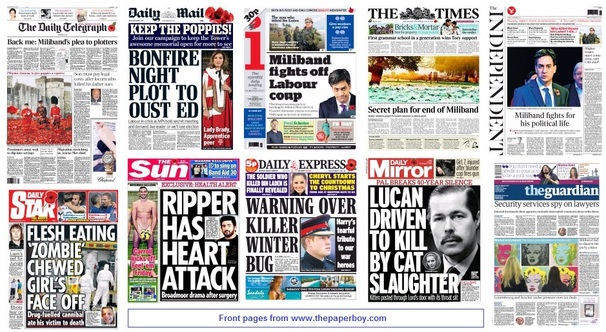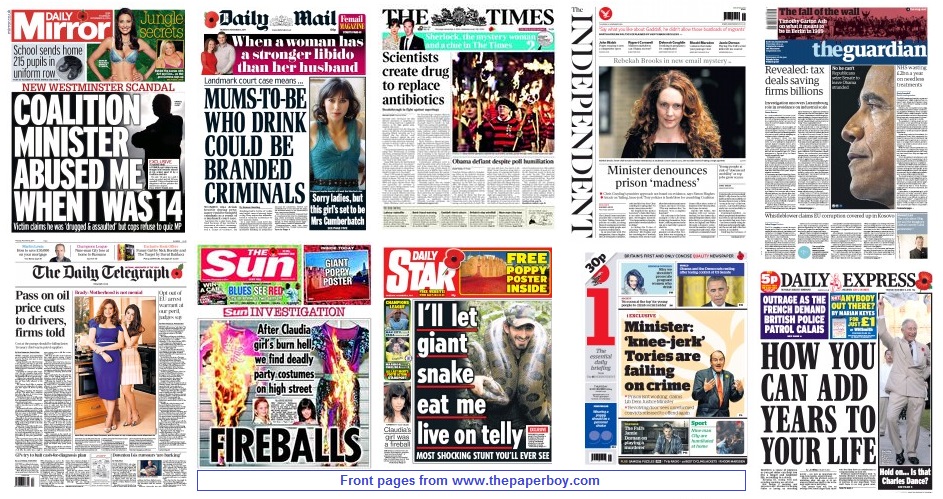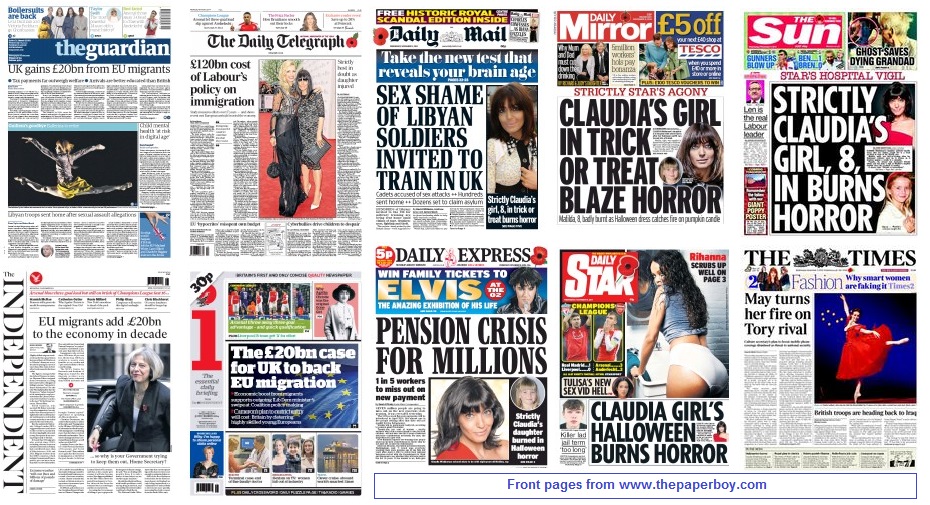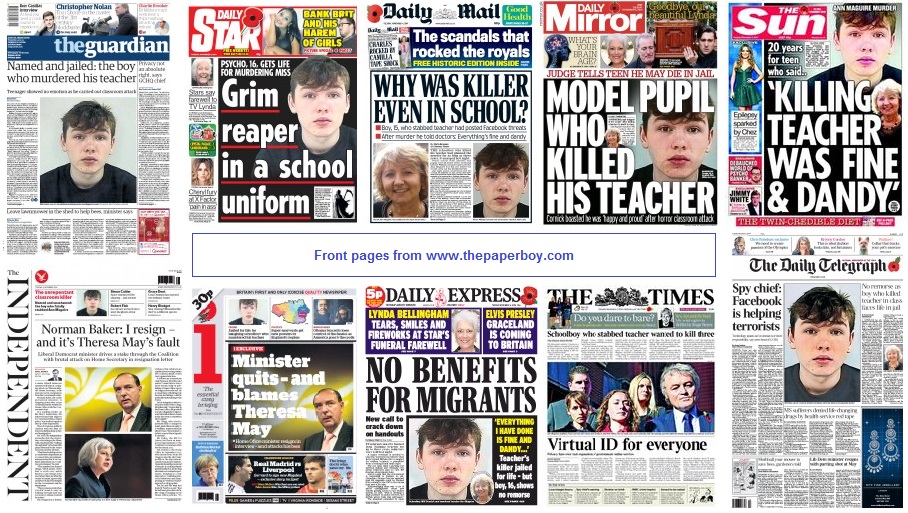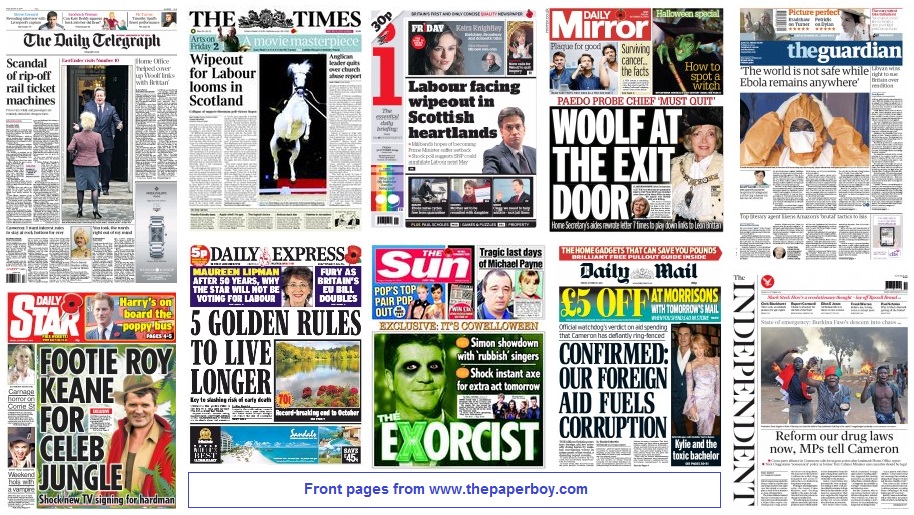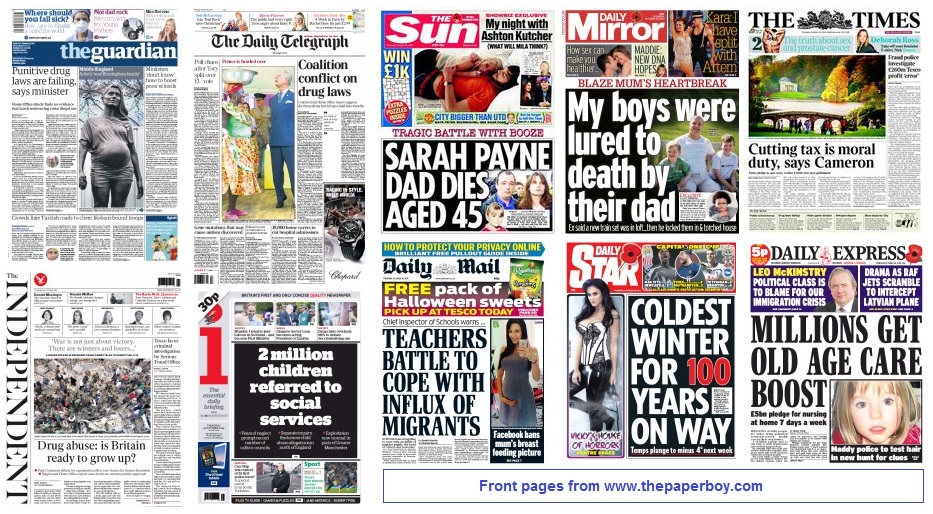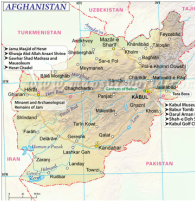Front pages Nov 3-7, 2014Friday 7 November, 2014
Thursday 6 November, 2014
An early morning tweet mocked the Sun for describing its splash as an investigation. Yes, it can be categorised as a "trip to the shops with a box of matches", but it was still a worthwhile exercise - and nobody else thought of it.
The people who make these cheap dressing-up costumes tend to work in firetrap factories in the Far East. Now it is being suggested that some of their products are just as dangerous. A dress bought at Sainsbury's was ablaze in half a minute and a onesie from M&S was in flames in a minute. A minute is quite a long time if someone is there to notice what is happening and knows what to do. But we know from Claudia Winkleman's experience that if backs are turned for more than a moment, the results can be horrifying. Perhaps the most encouraging aspect of this spread was the way that some of the cheapest outfits shrivelled or melted rather than catch alight. It would have been interesting if the Sun had taken the experiment a stage further to see how everyday clothes stand up. As we'd expect, Sainsbury's and M&S both emphasised that their products met safety regulations and were rigorously tested to a high standard. 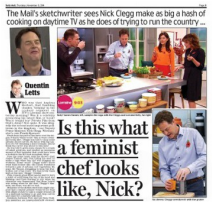
Haven't we heard something similar elsewhere this week? Oh yes, the Fawcett Society's
t-shirt. The Mail's Quentin Letts goes back to that today in a feature poking fun at Nick Clegg over his appearance on a daytime TV programme. To be fair, it's a reasonable target. Early in the piece Letts writes: "Fresh from his part in the farce over the slogan t-shirts..." Was it a farce? The jury's still out. The Mail on Sunday set the agenda with its "sweatshop" story about where the campaign t-shirts were made. But it didn't give the Fawcett Society, Whistles or ELLE, who combined to order and market them, enough time to reply in detail before publication. Fawcett produced a full statement on Sunday, but Monday's Mail ran only the section saying that the shirts would be withdrawn if ethical promises were not kept. On Tuesday Fawcett issued an update, in which it said it "categorically refuted" the allegation that the t-shirts were made in sweatshop conditions: An audit into the CMT factory was carried out in October 2014 by an independent not-for-profit organisation and this did not reveal any material concerns on the working conditions, the welfare or the health and safety of workers, and workers are able to join a union and there is a union presence in the factory. This was reported on the Mail's website, but has yet to appear in print.
The Fawcett update has disappeared from its website, but Darinka Aleksic, head of external relations, told SubScribe that this was not because the statement was being retracted; it was more likely because a further update on the investigation was being prepared. No doubt those findings will be reported fully by all newspapers that carried the sweatshop story. The Mail is very shouty and rarely misses an opportunity to have a dig at feminists, Clegg, Miliband, the Left, working mothers and assorted other targets, but it also has super-sensitive antennae when it comes to social issue stories. Its splash today is a good example. Cynics will wonder who the Mail will hate more, the irresponsible mother-to-be or the nanny state. It doesn't matter, what matters is the principle being decided in court: should a foetus be regarded as a living person? If the final verdict is "yes", then at what point does the it become one? At an arbitrary number of weeks into the pregnancy - 24 to chime with the abortion law? Earlier? The Mail recognises this, which is why it leads on the story. SubScribe: Mail makes hay with flawed feminist stunt Oh how editors must love UCL. It has come up with a batch of statistics on the hottest topic on the news agenda - and it can be interpreted in countless different ways.
For the Guardian, Independent and i, European migrants - those folk we have no power to keep out - have contributed £20bn to our economy. For the Telegraph, Mail and Times, immigrants from outside Europe have cost us £118bn. That stat doesn't help the debate over EU freedom of movement, but it's a nice big figure for those of the 'swamped' persuasion. The Mail will have cursed a missed trick when it saw the Telegraph, for that big number (rounded up to make it even bigger) relates to the period from 1995 to 2011. Labour was in power most of that time. How did the Mail fail to get that in its headline? An odd time span that. Why those years? And what about the £20bn, when was that? Oh that's from 2000 to 2011, which includes four years before those dreaded eastern Europeans were allowed in under EU laws. These figures are further broken down in the UCL document, showing that clever folk from Germany want to come here and suchlike. All in all, it's not so much a case of comparing apples and oranges as comparing apples with oranges, bananas, papaya, strawberries, grapes and pomegranates. Every paper swirls its spoon around this fruit salad to scoop up the bits it likes and avoid those that aren't to its taste. The Telegraph inflates the £118bn cost to £120bn and balances this with the net gain of £4.4bn from European migrants over the same period, but it doesn't mention the £20bn relating to this century. It does, however, refer to the more recent data in percentages on benefits, social housing and emploatyment. The Mail also rounds the cost up to £120bn and complains that it is buried in the report, "which sought to put an overwhelmingly positive gloss on the economic cost of mass immigration". The Times not only rounds up to £120bn, but rounds down to £4bn the fiscal benefit of migration from Europe. It does, however, produce the most comprehensible version of the story, moving on to the figures since 2000. On the other side of the debate, the Guardian concentrates on the 2000-11 figures and associated statistics, such as the assertion that 60% of immigrants from western and southern Europe are graduates. That is so specific in excluding the eastern Europeans that it feels dangerously like spin. The paper expands the story with a full page inside, with a three-column graphic containing just 20 circled numbers, a series of 'main point' blobs and a case study. The £118bn figure appears three pars from the end of the main text. The Independent looks exclusively at the numbers from this century, so doesn't mention the really big number at all. No one offers a figure for the net cost or contribution of non-EU immigrants from 2000 to 2011. For interpretation, the Times quotes one of the authors of the report, Christian Dustmann, director of the Centre for Research and Analysis of Migration at UCL, Andrew Green of MigrationWatch and David Green of Civitas, neither of which are known as huge immigration enthusiasts. The Mail also quotes the two Greens, but not the author or any commentary from the report itself, the Telegraph goes with Dustmann and Andrew Green.The Independent quotes Dustmann and Jonathan Portes of the National Institute for Economic and Social Research, who interprets the report as proving the advantages of immigration. Alan Travis in the Guardian quotes Dustmann, David Green and the James Brokenshire, the relevant minister. The Express, mysteriously, doesn't run the story at all. You can read the report without the spin here. The tabloids are far more interested in the trick or treating accident that landed Claudia Winkelman's eight-year-old daughter in hospital. The heavies also give it a good show - it's page three in the Times - and quite rightly so, as it's a story that strikes a chord on many levels: human interest, a timely alert for firework night, and - of course - Strictly. SubScribe couldn't, however, see the story anywhere in the Independent, not even a filler. If it wasn't there, that was a mistake. Coverage was helped by the fact that Matilda has appeared in a film and on the red carpet with her dad, which meant that photographs were readily available. Should they have been used? Did either parent give permission? The same questions might be asked about those of Will Cornick yesterday. Still on photographs, the Guardian and Times both put Sylvie Guillem on page 1, while the Telegraph and Independent have her inside. The ballerina has announced her retirement, making her a dead cert for the Times front - and the paper's 14th stand-alone dance photograph in the past fortnight. Tuesday 4 November, 2014
William Cornick is the only student to have killed a teacher in a British classroom. The stabbing of Ann Maguire generated extensive coverage, but until yesterday we knew next to nothing about her killer. He was arrested in the classroom, so contempt laws kicked in immediately, most papers also adhered to the convention - not a legal requirement - of not identifying a minor.
The public interest in this story is unquestionable, so there was no cause for the Times or Telegraph to pretend that there was a better one. Both have employed the old trick of giving most space to the story everyone wants to read, but maintaining a "serious" stance with a minimalist splash on something else. In the Times's case it is almost as far down the page as you'd expect from one of the redtops on a puff-heavy Saturday, while the Telegraph goes for the double-in-the-corner. The Times is a disaster all round, actually. A 1pt horizontal rule between the picture and the ID story is not going to convince anyone that the photograph belongs to the story above and not the one with the big heading underneath. It is also, of course, the wrong picture. Even the Express knew which one to run. The Express naturally goes its own sweet merry way with yesterday's Times lead on benefits for migrants, which may conceivably be of more interest to its declining readership than a boy of 15 stabbing his teacher to death because she had put him in detention for not doing his homework three years earlier. If you were determined not to lead on Cornick, then the two Independent papers have made the right choice with the resignation of Norman Baker and his attack on Theresa May. Back to the schoolboy, the Sun puts the picture too high on the page, but it has far and away the best headline. There were three striking elements to this story:
Let me just repeat that last one - a boy of 16 has been deemed so dangerous that he may never be released. Not one paper picked up that line in a front-page heading, and few used the "fine and dandy" quote, even though most had more than enough space in straps and subdecks. The Guardian's headlines are awful and not worth further consideration, but what about the Mail and Mirror with their almost opposite interpretations? 'Why was he in school?' asks the Mail. Because it was a schoolday. Because nobody believed that he really intended to kill anyone. The Mail's story doesn't suggest where Cornick should have been instead of in class, and it gives unreasonable prominence to all those people with 20-20 hindsight who say they knew he was dangerous. For the Mirror he was a model pupil, which sort of answers the Mail's question. The Mirror's conclusion is justified by a quote from the headmaster who described him as a delightful boy with an immaculate attendance record. He had also taken five GCSEs a year early. But come on, he'd been making threats - even if everyone believed them to be empty - and writing Facebook posts about murder and torture. That isn't the behaviour of a model pupil. The best advice on how to treat a great and important story is unchanging: tell it straight. Monday 3 November, 2014
The Star will be spitting feathers, rats' tails and spider legs. Fancy being beaten to the Katie Melua spider-in-the-ear story by the Mail on Sunday (page 3 - the front was otherwise occupied with its feminist sweatshop scoop). Not only is she a pretty celeb a rank or five above the Star's usual CBB stalwarts, but she had taken a photograph of the spider and posted it on Instagram - a week ago!
Staff in the neighbouring office were meanwhile busy tapping their barometers. When a Hallowe'en heatwave comes, can the icy blast of winter be far behind? Nope. Here is is right on cue. But hang on, one minute the Mail is stealing the Star's clothes, then next the Telegraph is marching all over the Express's territory with a splash on dementia tests. With the Guardian worrying about Ebola in North Korea, the TImes back on the benefits-for-migrants trail (another invasion of Express territory), and the Independent reverting to Islamists, we can conclude that there isn't a strong home news story for either end of the market. The British banker accused of murdering two women in Hong Kong therefore finds his face on most front pages and provides a splash for the Mirror and Sun, who are clearly grateful not to have to worry about contempt. Several papers carry the story about warnings to Branson's space team that leads the Mail - although they don't agree on the nature of the alleged alerts. On the inside pages, Trevor Kavanagh devotes his Monday Sun leader page slot to chunks of the closing defence speech in the Old Bailey trial of two journalists and a prison officer accused of exchanging money and information about prisoners including Jon Venables. This is an extraordinary use of a comment space. The paper has given little coverage to the trial and certainly nothing on this scale before, so it is most unbalanced journalism. Nor is this a contemporaneous report, since the court doesn't sit over the weekend so today was not the first available issue for publication of the material. John Butterfield's views on the importance of a free Press will be shared by many and, as Kavanagh writes, the paper will doubtless return to them. But in this instance they have been put forward in defence of a reporter accused of conspiracy and this presentation is inappropriate. See the weekend papers here See last week's papers here Friday 31 October, 2014
A couple of weeks ago the Sun declared war on comparison websites, saying they were concealing deals from companies that didn't pay them commission. Some cheaper options would appear only if a prechecked box was unchecked.
It caused quite a stir and the paper joined forces with an organisation called the Big Deal to try to use mass buying power to secure better energy prices for its readers. We should learn in the next few days how that has worked out. It's an interesting enterprise, although SubScribe is not entirely comfortable with it. Nor did the "scandal" seem to be particularly heinous, the savings gained by unticking that box were not large and we know from TV and newspaper advertising that some companies do not make all - or even any - of their packages available through comparison sites. Today the Telegraph comes up with a similar story, which has some far more striking figures. The structure of rail fares in this country has for years been absurd, with advance and online prices showing huge variations from those available at ticket offices. Now the Telegraph tells us that machines standing side by side on big station concourses are offering tickets for the same journey with a price difference of £100 or more. There are some splendid examples of how passengers could save money. It apparently costs half as much to travel from Carlisle to Manchester if the journey is split into chunks for ticketing purposes as it does to buy one ticket for the whole trip. But is it fair to expect a machine to suggest to a passenger in Chester-le-Street that if they want to go to Manchester, they'd be better off buying a ticket to Barrow 60 miles along the track and getting off early? Maybe not, but it can't be right for a machine not to offer a simple off-peak option for a journey, as another example states. This is important, not least because passengers risk big fines if they dare board a train without a ticket - you can't even get a permit to travel now - and if the booking office is closed, they are at the mercy of the machine. A good job well done here. Overseas aid Less well done is the Mail's deliberate over-interpretation of a report into the impact of Britain's overseas aid efforts. The report, by the Independent Commission for Aid Impact, does indeed give the Department for International Development an "amber-red" rating, which calls for significant improvements. The report does say that Dfid has not paid enough attention to the impact of corruption on the lives of the poor or developed an approach equal to the challenge. It also says that the £22m directly targeted at fighting corruption should be set against an overall budget of £10.3bn. The Mail does not agree with the way that taxpayers' money is sent abroad and has long argued that it is bolstering disreputable regimes. So its splash heading this morning is entirely understandable and, indeed, justified. But it couldn't resist pushing that bit further: The billions Britain pours into foreign aid are actually doing harm by making corruption worse in many parts of the world, a damning report reveals. In fact, the report focuses tightly on the effects on the poor of Dfid's anti-corruption efforts since 2011 in just two countries - Nepal and Nigeria, which between them account for 5% of the foreign aid budget. Nigeria received a little under £437m between 2011 and 2013 and Nepal about £160m. Hardly "billions".
Nor does the report criticise the department for spending too little of its budget on fighting corruption, as the Mail asserts. It actually says:. Dfid was unable to tell us how much it spends on anti-corruption activities. We, therefore, could not form a view as to the relative weight given to anti-corruption work within DFID’s overall development assistance It points out that spending specifically aimed at fighting corruption had risen from £3.5m since 2008 and that it is projected to rise to £190m by 2018. But it adds that the figures "significantly underestimated" Dfid's efforts because they didn't include money spent indirectly or through other agencies, including the UN.
This report does not put Dfid in a good light and it gives the Mail ammunition for its argument that our money isn't reaching the right people. So why did it have to over-egg the pudding? Finally, SubScribe makes no apology for repeating that while overseas aid spending has increased greatly to reach 0.7% of GDP, that means 99.3% of our money goes on other things. And many of them are a great deal less deserving. Thursday 30 October 2014
Fact, spin and opinion battle for the highground today.
First, three of the four heavyweights put drugs at the top of their schedules. What is particularly interesting is that the intros are almost the same, but the headings go in three different directions. "There is no evidence that tough enforcement of the drug laws on personal possession leads to lower levels of drug use, according to the government's first evidence-based study," writes Alan Travis in the Guardian. The Independent takes its first paragraph slightly further - referring to a punitive approach, including locking up addicts, failing to curb addiction. The Telegraph turns it round to say: "Decriminalising drugs would have little effect on the number of people abusing illegal substances." Look then at the headings: for the Guardian drug laws are failing; the Telegraph moves away from the nub of the report to home in on disagreements within the Government over how to respond to it; the Independent editorialises with its loaded question. We're used to newspapers approaching stories according to their own perspective or agenda, but this is an unusual example of a fact that would have been compelling without embellishment being dressed up unnecessarily, as though it were not strong enough to stand up as a splash on its own without a row or a bit of posturing. Cameron's tax pledge The Times, which puts the story on 16 under the heading "Drug laws don't work, ministers admit" is meanwhile busy printing shameless Conservative propaganda. The paper leads on a write-off of a David Cameron OpEd piece in which he asserts that the average taxpayer would be £3,800 better off over the next parliament if he, rather than Ed Miliband, returned to Downing Street next May. The calculations that lead to this conclusion are so tortuous that the first-edition sub misinterpreted the figure as an annual gain. The reporters do try to leaven the party political broadcast with a limp attempt at impartial assessment: "A leading independent expert was unable to endorse the figures, saying that the benefit might be up to £1,000 less than the Conservatives suggest." Why isn't this expert named? There are also a couple of explanatory/questioning paragraphs on the turn. These suggest that Cameron has reached his figure by going back to 2010 and then assuming that if Labour had stayed in office it would have increased the personal allowance in line with RPI over this parliament, which would have taken it to £7,500 rather than the £10,500 at which it stands today. That's a bit presumptuous, but that's politics for you. But what happens with the hypothesis after 2015? Does Cameron assume that Labour would continue to lift that allowance in line with RPI? What about Miliband's pledge to reinstate the 10p lower rate of tax? Indeed, mightn't he have done so by now? The Times does point out that Cameron's numbers do not take account of benefit changes or the freezing of working tax credits for two years. The story also mentions a surge in "stealth" taxes over the past ten years, although it doesn't say how much of the extra take was down to Gordon Brown and how much to Cameron. It's all smoke and mirrors. If you have the Prime Minister writing for you, you are almost bound to splash on what he has to say. That leaves you with the choice of subjecting his figures to proper scrutiny - thereby running the risk of disproving claims put forward by one of your columnists - or of accepting what he says at face value and being accused of printing propaganda. Which is why the Times's former policy of not running columns by serving politicians was a good one. It should be reintroduced - and others (who have this week offered space to Yvette Cooper, David Blunkett and Nigel Farage among others) should follow suit. SubScribe: crunching Cameron's numbers |
|











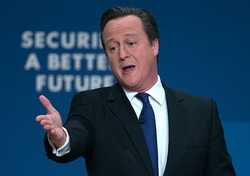




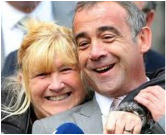





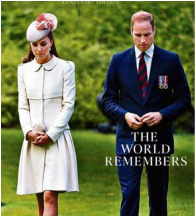

Sean Langan was invited to give evidence about Afghanistan to the foreign affairs select committee's inquiry into global security. Its members could not find Helmand on a map.
"The foreign affairs select committee: they're supposed to be specialists. They had sent soldiers to die in Helmand and they didn't know where it was." Frontline reporting |
Please sign up for SubScribe updates
(no spam, no more than one every week or two)
|
|
|
